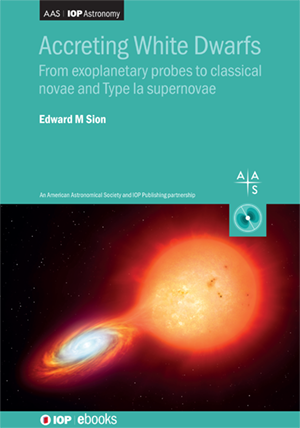Astrophysics and Planetary Science Professor Edward Sion, PhD, Examines Accreting White Dwarfs in New Book

Villanova, Pa – When a star dies, what remains? Out of the nearly 200 billion stars in our Milky Way Galaxy, 97% will eventually become white dwarfs, shedding their outer layers and leaving behind a dense, hot core roughly the size of the Earth. These fascinating entities shed light on the history of star formation, give us a glimpse into the future of the Sun’s evolution, and provide insight into the age of the universe.
In recent years, research on white dwarf stars has greatly expanded. In his new book, “Accreting White Dwarfs: from Exoplanetary Probes to Classical Novae and Type Ia Supernovae” (Institute of Physics Publishing, 2023), Villanova University Astrophysics and Planetary Science Professor Edward Sion, PhD, presents a thorough exploration of this rapidly expanding discipline.
Designed for advanced undergraduates, graduate students, postdoctoral scholars and astrophysicists, Dr. Sion’s book offers insights into the accretion process of white dwarfs. “The book emphasizes how fundamentally important the physics of accreting white dwarfs is to a broad range of astrophysical phenomena,” says Dr. Sion. He further explains that white dwarfs play a key role in many areas of astrophysical research, including the formation, composition, structure and evolution of exoplanetary systems orbiting other stars. Dr. Sion also discusses their part in classical nova explosions and the explosions of Type Ia supernovae, a type of supernova that provides evidence that the expansion of the universe is accelerating and led to the discovery of dark energy behind this phenomenon.
Dr. Sion received his bachelor’s and master’s degrees in Astronomy from the University of Kansas in 1968 and 1969, respectively, and earned his PhD in Astronomy from the University of Pennsylvania in 1975. In 1983, he led a team that developed the fundamental classification system of dwarf stars, a system that is now used worldwide and characterizes the chemical composition class and surface temperature of each white dwarf identified spectroscopically. With over 640 scientific publications, 64 of which share authorship with Villanova students, Dr. Sion continues to have a strong impact on the field and has been ranked in the top 2% of researchers globally by Stanford University since 2019.
About Villanova University’s College of Liberal Arts and Sciences: Since its founding in 1842, Villanova University’s College of Liberal Arts and Sciences has been the heart of the Villanova learning experience, offering foundational courses for undergraduate students in every college of the University. Serving more than 4,500 undergraduate and graduate students, the College is committed to fortifying them with intellectual rigor, multidisciplinary knowledge, moral courage and a global perspective. The College has more than 40 academic departments and programs across the humanities, social sciences, and natural and physical sciences.
